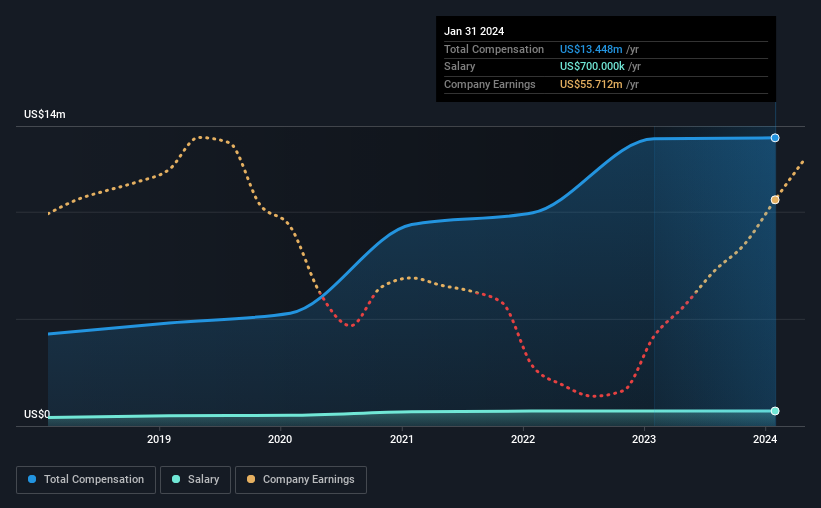- United States
- /
- Healthcare Services
- /
- NasdaqGS:HQY
We Think Some Shareholders May Hesitate To Increase HealthEquity, Inc.'s (NASDAQ:HQY) CEO Compensation

Key Insights
- HealthEquity to hold its Annual General Meeting on 27th of June
- Salary of US$700.0k is part of CEO Jon Kessler's total remuneration
- The overall pay is comparable to the industry average
- HealthEquity's EPS grew by 153% over the past three years while total shareholder loss over the past three years was 1.2%
In the past three years, the share price of HealthEquity, Inc. (NASDAQ:HQY) has struggled to generate growth for its shareholders. Despite positive EPS growth in the past few years, the share price hasn't tracked the fundamental performance of the company. The AGM coming up on the 27th of June could be an opportunity for shareholders to bring these concerns to the board's attention. Voting on resolutions such as executive remuneration and other matters could also be a way to influence management. We think shareholders might be reluctant to increase compensation for the CEO at the moment, according to our analysis below.
View our latest analysis for HealthEquity
Comparing HealthEquity, Inc.'s CEO Compensation With The Industry
According to our data, HealthEquity, Inc. has a market capitalization of US$7.4b, and paid its CEO total annual compensation worth US$13m over the year to January 2024. That's mostly flat as compared to the prior year's compensation. While we always look at total compensation first, our analysis shows that the salary component is less, at US$700k.
On comparing similar companies from the American Healthcare industry with market caps ranging from US$4.0b to US$12b, we found that the median CEO total compensation was US$11m. This suggests that HealthEquity remunerates its CEO largely in line with the industry average. Moreover, Jon Kessler also holds US$22m worth of HealthEquity stock directly under their own name, which reveals to us that they have a significant personal stake in the company.
| Component | 2024 | 2023 | Proportion (2024) |
| Salary | US$700k | US$700k | 5% |
| Other | US$13m | US$13m | 95% |
| Total Compensation | US$13m | US$13m | 100% |
On an industry level, around 21% of total compensation represents salary and 79% is other remuneration. In HealthEquity's case, non-salary compensation represents a greater slice of total remuneration, in comparison to the broader industry. If total compensation is slanted towards non-salary benefits, it indicates that CEO pay is linked to company performance.

A Look at HealthEquity, Inc.'s Growth Numbers
HealthEquity, Inc. has seen its earnings per share (EPS) increase by 153% a year over the past three years. Its revenue is up 16% over the last year.
This demonstrates that the company has been improving recently and is good news for the shareholders. This sort of respectable year-on-year revenue growth is often seen at a healthy, growing business. Looking ahead, you might want to check this free visual report on analyst forecasts for the company's future earnings..
Has HealthEquity, Inc. Been A Good Investment?
Given the total shareholder loss of 1.2% over three years, many shareholders in HealthEquity, Inc. are probably rather dissatisfied, to say the least. Therefore, it might be upsetting for shareholders if the CEO were paid generously.
In Summary...
Shareholders have not seen their shares grow in value, rather they have seen their shares decline. The fact that the stock price hasn't grown along with earnings may indicate that other issues may be affecting that stock. Shareholders would be keen to know what's holding the stock back when earnings have grown. The upcoming AGM will be a chance for shareholders to question the board on key matters, such as CEO remuneration or any other issues they might have and revisit their investment thesis with regards to the company.
If you think CEO compensation levels are interesting you will probably really like this free visualization of insider trading at HealthEquity.
Of course, you might find a fantastic investment by looking at a different set of stocks. So take a peek at this free list of interesting companies.
Valuation is complex, but we're here to simplify it.
Discover if HealthEquity might be undervalued or overvalued with our detailed analysis, featuring fair value estimates, potential risks, dividends, insider trades, and its financial condition.
Access Free AnalysisHave feedback on this article? Concerned about the content? Get in touch with us directly. Alternatively, email editorial-team (at) simplywallst.com.
This article by Simply Wall St is general in nature. We provide commentary based on historical data and analyst forecasts only using an unbiased methodology and our articles are not intended to be financial advice. It does not constitute a recommendation to buy or sell any stock, and does not take account of your objectives, or your financial situation. We aim to bring you long-term focused analysis driven by fundamental data. Note that our analysis may not factor in the latest price-sensitive company announcements or qualitative material. Simply Wall St has no position in any stocks mentioned.
Have feedback on this article? Concerned about the content? Get in touch with us directly. Alternatively, email editorial-team@simplywallst.com
About NasdaqGS:HQY
HealthEquity
Provides technology-enabled services platforms to consumers and employers in the United States.
Excellent balance sheet with reasonable growth potential.
Similar Companies
Market Insights
Community Narratives



